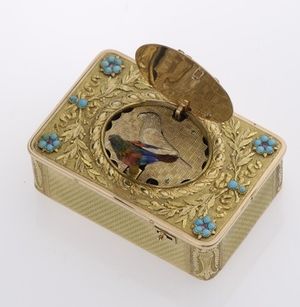Rochat: Unterschied zwischen den Versionen
| Zeile 15: | Zeile 15: | ||
*[[Rochat, James]], Newcastle-o.-T., 1804 Klein- und Großuhren <ref>[[Watchmakers & Clockmakers of the World]]; Autor: Baillie, G. H.; Seite 273; ISBN 140679113X</ref> | *[[Rochat, James]], Newcastle-o.-T., 1804 Klein- und Großuhren <ref>[[Watchmakers & Clockmakers of the World]]; Autor: Baillie, G. H.; Seite 273; ISBN 140679113X</ref> | ||
*[[Rochat, Jean Marc David]], [[Genf]], um 1775 bis 1791 <ref>[[Watchmakers & Clockmakers of the World]]; Autor: Baillie, G. H.; Seite 273; ISBN 140679113X</ref> | *[[Rochat, Jean Marc David]], [[Genf]], um 1775 bis 1791 <ref>[[Watchmakers & Clockmakers of the World]]; Autor: Baillie, G. H.; Seite 273; ISBN 140679113X</ref> | ||
*[[Rochat, Jules]], London, 1839 bis 1869 <ref>[[Watchmakers & Clockmakers of the World]]; Autor: Brain Loomes; Seite 201; ISBN 0719803306</ref> | |||
*[[Rochat, Louis]], [[Le Brassus]], 1825, Maker of automats, Very fine mus. aut. clock Palace M. Peking <ref>[[Watchmakers & Clockmakers of the World]]; Autor: Baillie, G. H.; Seite 273; ISBN 140679113X</ref> | *[[Rochat, Louis]], [[Le Brassus]], 1825, Maker of automats, Very fine mus. aut. clock Palace M. Peking <ref>[[Watchmakers & Clockmakers of the World]]; Autor: Baillie, G. H.; Seite 273; ISBN 140679113X</ref> | ||
Version vom 30. Oktober 2012, 02:17 Uhr
Mehrfachnennung

Schweizer Uhrmacherfamilie
Die Schweizer Uhrmacherfamilie Rochat zählt zu den berühmtesten des Schweizer Vallée de Joux. 1719 errichteten die Rochats in Le Brassus ein Wohnhaus und begannen neben einfachen Rohwerken mit Spindelhemmungen auch Repetitionskadraturen mit Carillon und Musikspielwerke überwiegend für Genfer Firmen zu fertigen. 1815 siedelte Pierre Rochat mit seinen Söhnen Ami Napoléon und Louis nach Genf über. Sie spezialisierten sich auf Musikspielwerke und Singvogelautomaten, die sie mit „Pierre Rochat & fils“ signierten. Später machten sich die Söhne selbständig und setzten unter der Signatur „Rochat Frères“ die erfolgreiche Tradition mit ihren berühmten Kadraturen fort. Die Nachfolger der Brüder Rochat assoziierten sich nach 1820 mit Louis Reymond, einem hervorragendem Schüler von Breguet. Ab 1923 fertigten sie sehr gute Rohwerke mit Seconde morte und Repetitionskadraturen unter der Signatur „Rochat, Reymond & Cie.“. Sie dehnten ihren Uhrenhandel bis nach China aus. Auch heute sind noch Mitglieder der Rochat-Familie in der Uhrenbranche tätig.
Personen
- Rochat, ---, Paris, 1825, mus. clocks [1]
- Rochat, Ami Napoléon
- Rochat, E., Genf, Anfang 19. Jahrhundert [2]
- Rochat, Henry, London, 1851 [3]
- Rochat, Jacob, London, 1777 bis 1791, Kleinuhr [4]
- Rochat, Jacob Henry, Sohn von Rochat, Jacob, London, Ausbildung 1792 [5]
- Rochat, Jacques, Le Brassus, um 1760 [6]
- Rochat, James, Newcastle-o.-T., 1804 Klein- und Großuhren [7]
- Rochat, Jean Marc David, Genf, um 1775 bis 1791 [8]
- Rochat, Jules, London, 1839 bis 1869 [9]
- Rochat, Louis, Le Brassus, 1825, Maker of automats, Very fine mus. aut. clock Palace M. Peking [10]
Firmen
- Alfred Rochat & Fils
- Aguitton & Rochat
- D. Rochat et Fils, Le Brassus, 1802 bis 1813, fertigte u.a. Singvogeldosen [11]
- Les Frères Rochat, Mehrfachnennung
- Pierre Rochat & Fils
- Rochat et Josseaume, Genf, Anfang 19. Jahrhundert [12]
- Rochat Frères
- Rochat, Reymond & Cie.
Weiterführende Informationen
Quellen
- ↑ Watchmakers & Clockmakers of the World; Autor: Baillie, G. H.; Seite 273; ISBN 140679113X
- ↑ Watchmakers & Clockmakers of the World; Autor: Baillie, G. H.; Seite 273; ISBN 140679113X
- ↑ Watchmakers & Clockmakers of the World; Autor: Brain Loomes; Seite 201; ISBN 0719803306
- ↑ Watchmakers & Clockmakers of the World; Autor: Baillie, G. H.; Seite 273; ISBN 140679113X
- ↑ Watchmakers & Clockmakers of the World; Autor: Baillie, G. H.; Seite 273; ISBN 140679113X
- ↑ Watchmakers & Clockmakers of the World; Autor: Baillie, G. H.; Seite 273; ISBN 140679113X
- ↑ Watchmakers & Clockmakers of the World; Autor: Baillie, G. H.; Seite 273; ISBN 140679113X
- ↑ Watchmakers & Clockmakers of the World; Autor: Baillie, G. H.; Seite 273; ISBN 140679113X
- ↑ Watchmakers & Clockmakers of the World; Autor: Brain Loomes; Seite 201; ISBN 0719803306
- ↑ Watchmakers & Clockmakers of the World; Autor: Baillie, G. H.; Seite 273; ISBN 140679113X
- ↑ Watchmakers & Clockmakers of the World; Autor: Baillie, G. H.; Seite 273; ISBN 140679113X
- ↑ Watchmakers & Clockmakers of the World; Autor: Baillie, G. H.; Seite 273; ISBN 140679113X